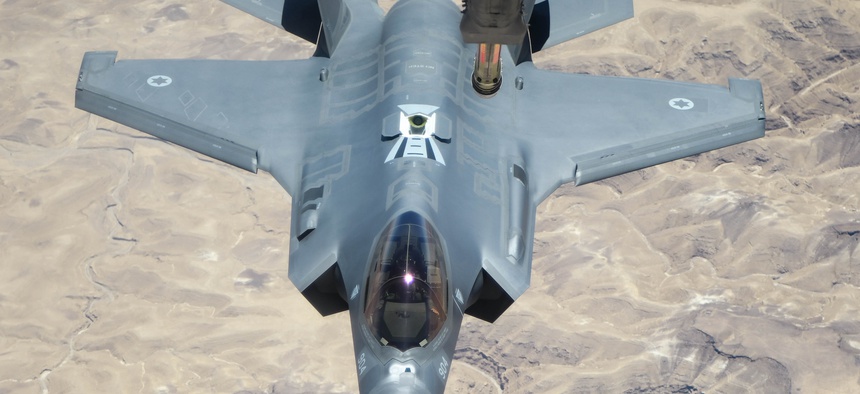Tensions with Iran and Hezbollah along Israel’s northern borders are pointed reminders of the looming potential for a major war on that front. But as America’s presence recedes from the Middle East, Israel needs the proper tools to continue advancing U.S. interests by deterring and rolling back Iran’s military expansion.
Washington can help Jerusalem address these shared threats by replenishing and updating its stockpile of prepositioned weapons in Israel, known as WRSA-I. For decades, American officials have stated repeatedly how this arms depot, which Israel pays to maintain, helps support Israel in emergencies and ensures its ability to defend itself at acceptable cost – its “qualitative military edge” – something U.S. law requires the United States help uphold.
But as our new report by the Jewish Institute for National Security of America demonstrates, the stockpile now is falling dangerously short of its intended purpose as a strategic fallback for Israel. Most concerning there is a shortfall of precision-guided munitions, or PGMs, specifically those Israel’s combat aircraft can use against ground targets in a large-scale conflict with Iran, Hezbollah, and possibly others. The shortages facing Israel will only grow if the U.N. conventional arms embargo on Iran is allowed to expire in October.
Together, these factors raise the risk for America of a challenging emergency resupply of Israel in wartime, as during the 1973 Yom Kippur War. It also undermines Israel’s ability to continue defending U.S. interests by defending itself.
Particularly worrisome is the stockpile’s shortage of thousands of Joint Direct Attack Munitions, or JDAMs, which convert unguided bombs into precision weapons. Iran is proliferating cheap and plentiful rockets and missiles – with increasing precision – to Hezbollah and other proxies, intending to overwhelm Israel’s sophisticated air defenses in a major conflict. Israel’s ability to prevail at acceptable cost will depend on abundant JDAMs and other precision munitions to target these rockets and missiles – 130,000-plus in Lebanon alone – and compensate for its limited defenses, while minimizing collateral damage to civilians.
Yet Israel’s ongoing air campaign against Iran in Syria and Iraq, including the recent strike that killed a Hezbollah operative outside Damascus, is already consuming a good deal of previous purchases of tens of thousands of U.S.-made PGMs. Simultaneously, due to production capacity issues at home and high combat usage against ISIS, the U.S. military faces challenges maintaining its own PGM stocks, let alone supplying them to allies.
Such persistent shortages reinforce the Pentagon’s reluctance to store PGMs in Israel, given that Israel is not highly integrated into the U.S. military’s global logistics supply chains and U.S. forces generally do not operate from Israel.
Furthermore, Congress stipulates the stockpile’s total value – currently estimated at $1.8 billion to $2.2 billion – but the Pentagon determines the actual contents. Thus even as the stockpile’s dollar amount grows markedly over time, it becomes better suited for U.S. defense needs than for supporting Israel in an emergency.
These factors are combining to undermine a critical pillar of America’s commitment to Israel’s self-defense, just as Congress begins considering defense spending cuts in the wake of COVID-19. If not addressed, these developments could frustrate what is otherwise a strong bilateral partnership and undermine Israeli deterrence against Iran.
Fortunately, there are multiple options to fulfil WRSA-I’s stated intent and ensure Israel has adequate PGMs. With the U.S. military’s own procurement of certain PGMs projected to decrease, there could be spare production capacity to update the stockpile with JDAMs, and GBU-39 and GBU-53/B small diameter bombs.
This could be accomplished as part of an expansion of the strictly bilateral stockpile into a regional prepositioning hub for Israel, the United States and others. In building a regional depot, the United States should consider relocating some existing stocks in the Middle East to Israel, which provides a securer prepositioning location. Such a move would not initially involve new U.S. financial outlays.
Meanwhile, Congress should instruct the Government Accountability Office or others to produce the first non-confidential assessment of whether America’s stated intent for WRSA-I is being met.
Deliveries of PGMs to Israel also could be expedited through the Special Defense Acquisition Fund. The Pentagon would finance the initial purchase of PGMs – for instance, it could start procuring hundreds of JDAMs totaling several million dollars a year – for their eventual sale to Israel. This would give U.S. defense companies a head start on production and would shorten delivery times, with Israel still paying for the weapons upon delivery.
At the same time, Israel could increase the rate and volume of PGM deliveries by offering larger and more steady procurement contracts with U.S. companies. As we laid out in a report late last year, this could be done through various financing options that shift forward, or “frontload,” funds spelled out in the 2016 Obama-era memorandum of understanding on defense assistance to Israel, without raising the annual cost to the United States.
As events increasingly shift the burdens of collective defense onto America’s allies, fulfilling the stated intent for the U.S. weapons stockpile in Israel would ensure a key partner has the necessary tools to help defend itself and America’s national security.
Gen. (ret.) Charles Wald, former Deputy Commander of U.S. European Command, is a Distinguished Fellow at the Jewish Institute for National Security of America’s (JINSA) Gemunder Center for Defense and Strategy. Michael Makovsky is President and CEO of JINSA and a former Pentagon official.
Originally published in Defense One

